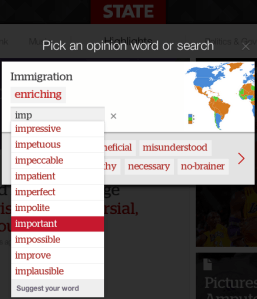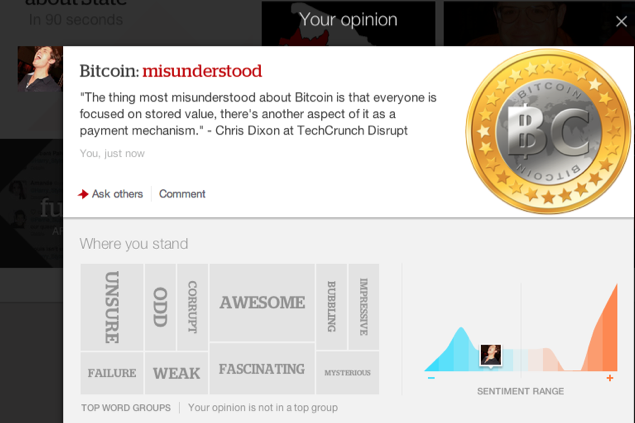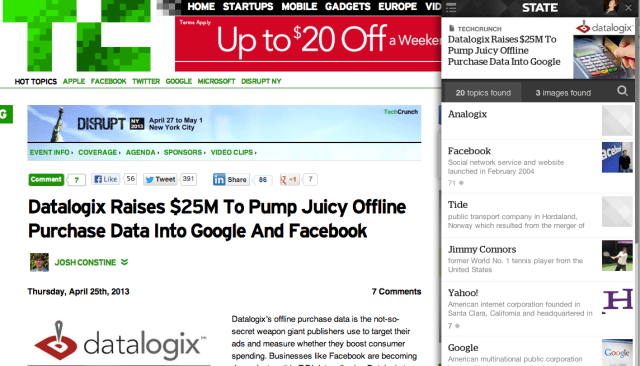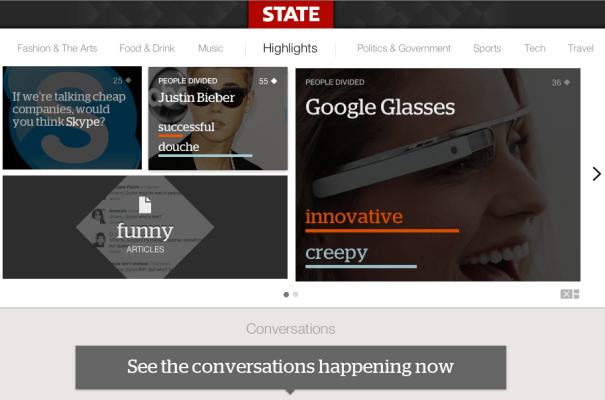Twitter is great if you’re famous. But Jawbone’s founding CEO Alexander Asseily thinks everyone deserves a powerful voice online, so today he’s launching State, a structured opinion-sharing network where people don’t need to follow you see your posts. You can get an early State invite now and start contributing to an opinion graph where what matters is what you believe, not who follows you.
An Equal Opportunity Opinion Graph
Let’s be honest. Twitter seemed like it would host a global conversation, but it’s evolved into a one-to-many broadcast network. In fact, Twitter’s about page touts “You don’t have to tweet to get value from Twitter.” Or, let experts, artists, comedians, and celebrities tweet, you just sit back and take it. And in practice, you don’t have much of a choice. Unless you have some special way to gain followers, your audience will remain some subset of your friends on Twitter. Barring the rare tweet that goes viral in a big way, the average user’s voice doesn’t travel very far.
 That doesn’t mean Twitter doesn’t have it’s place. As a journalist it’s a vital tool, but there’s a need for a more egalitarian way to share publicly. That’s what State could be. The service launched today at TechCrunch’s Disrupt NY conference, and you can see State’s loud and proud launch video here.
That doesn’t mean Twitter doesn’t have it’s place. As a journalist it’s a vital tool, but there’s a need for a more egalitarian way to share publicly. That’s what State could be. The service launched today at TechCrunch’s Disrupt NY conference, and you can see State’s loud and proud launch video here.
State co-founder Alexander Asseily explains to me, “The Internet would be better if it was organized around what people think instead of who they are, or where they shop, or what they browse. All the intelligence that’s gathered online today is gathered by following people. It’s not very empowering to people, and it’s not a precise way of getting insights about what people think.” Luckily, Alexander and his brother Mark, who was formerly head of product at VOIP startup Rebtel and is now State’s CEO, have $14 million in seed funding to reorganize the web.
Structure Plus Speed
Organization is actually one of State’s key differentiators. Rather than start with an open text field, when you “State” an opinion, you use type-ahead boxes to pick a topic or paste in a link and choose several words that describe it. For example you could pick the portable stereo Big Jambox and call it “Amazing” and “Loud”, Bitcoin and describe it as “fad” or “misunderstood”, actor Christian Bale as “talented” or “deteriorating”, or TechCrunch’s article “Google Now Launches On iOS” and call it “overdue” or “inferior”.
This typeahead system makes it extremely quick to share an opinion. Alexander tells me “The objective is to make it accessible in practice to everyone ,which means making it so easy that you can use it for both serious and frivolous opinions.” If you want to leave more complex thoughts, you can always tack on a longer text description.

Instead of these posts going just to your followers, State surfaces them to anyone interested in the topic you’re talking about. The homepage shows popular topics and sentiments you can respond to. State also focuses on showing them to people the minute you publish, so there’s a feeling of real-time feedback and community. That’s why State’s structured data is so important. It creates a precise, interconnected graph of thoughts, while other social networks are more scattershot. There’s still some interface quirks that could cause confusion, and you can’t delete posts just yet, but the publishing system is strong for version 1.
State also shows you what the world thinks about a certain topic with a slick word-cloud visualization, as well as where you stand compared to everyone else. Structure begets aggregation, which reveals insights.
And beyond what you do on State, Alexander wants its data to be valuable elsewhere. Along with its bookmarklet for importing and posting about websites, State wants to eventually serve as a replacement or supplement to blog comments. It could replace swarms of trolls drowning out sane ideas with a structured view of what people thought about the article’s content. This could also draw more traffic to publishers because it exposes their articles to the State network alongside opinions.

Finally, Alexander hopes to release a State API that gives open access to its structured data. For example a politics site could employ State data to show off a synopsis of perceptions of different politicians or legislation. Alexander says “we could potentially monetize that somehow.” API apps and publisher integrations could also solve State with its biggest problem.
Revealing We To We
Proving its unique value and gaining traction will be the real challenge for State. If you asked most people where they share their opinions, they’d tell you Twitter or Facebook. It’s no easy task explaining why structured data and nerdy aggregations are reasons to add another web service to their lives. But State hopes to wake the world up to what they’re missing. If it succeeds, there’s a second-order benefit for us all. Alexander concludes, “The ultimate goal is much self-awareness in society — products that are built with the opinions of the market in mind, or political and cultural decisions made in the same way.”
Visit State to get an early invite, and watch my interview with Alexander Asseily about how State answers what broken with Twitter
